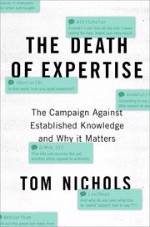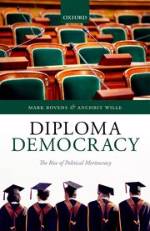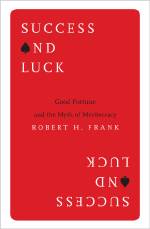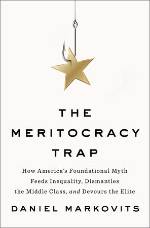The Meritocracy Muddle
Populist resentment against “elites” is a recurring feature of modern democracy, owing to the fact that popular sovereignty is at odds with the careful management of increasingly complex economies. But what causes public discontent to explode at some times rather than others?
- Mark Bovens and Anchrit Wille, Diploma Democracy: The Rise of Political Meritocracy, Oxford University Press, 2017.
Robert H. Frank, Success and Luck: Good Fortune and the Myth of Meritocracy, Princeton University Press, 2016.
Daniel Markovits, The Meritocracy Trap: How America’s Foundational Myth Feeds Inequality, Dismantles the Middle Class, and Devours the Elite, Penguin Press, 2019.
Tom Nichols, The Death of Expertise: The Campaign Against Established Knowledge and Why It Matters, Oxford University Press, 2017.
CHICAGO – If anyone still doubted that we live in a populist era, the surfeit of recent books which aim to make sense of the current moment should settle the matter. If these efforts are not always successful, that is partly because populism itself can be so conceptually slippery. Commentators use it to describe the revolt of ordinary people against experts and elites, but few ever carefully define who belongs to which group and why.
Who is an “ordinary” person? Is it just someone without a university degree or a lot of money? Is it someone who lives in a rural area, and is perhaps religious and conservative? And who, for that matter, are the “experts,” and what sets them apart from the “elites”? The only thing that is clear is that calling someone a member of the “elite” now packs a formidable rhetorical punch. Presumably, that is why Nobel laureates, university professors, newspaper columnists, TV talking heads, politicians, and other elites so often accuse each other of being elitist.
Given the depth of today’s moral panic over populism, one might conclude that rubes and hayseeds have the world’s developed democracies by the throat. And yet, in the case of the United States, populism is as old as the country. In the founding era, opponents of the new constitution accused merchant and planter elites of seeking to install an American aristocracy in place of the British aristocracy that had just been defeated. James Madison and Thomas Jefferson appealed to populist sentiment in order to unseat the Federalist administration of John Adams; Andrew Jackson rode a populist backlash against Washington, DC, elites all the way to the White House in 1828.
Similarly, the Populists of the late nineteenth century built a political movement by attacking party, urban, cosmopolitan, and intellectual elites. Then, with the rise of technocratic government at the beginning of the twentieth century, the populist impulse widened its scope, setting its sights on expertise, in addition to elitism. And in the 1930s, President Franklin D. Roosevelt managed both to beat back populist demagogues and brilliantly channel populist sentiment in the service of his own agenda.
POPULISM, OR AMNESIA?
The hatred of experts and elites never went away. It sustained US Senator Joe McCarthy’s anti-communist crusade and the Red Scare of the 1950s. Alabama Governor George Wallace wielded it in his fight against school desegregation in the 1960s. Presidents Richard Nixon, Jimmy Carter, and Ronald Reagan all drew on populist themes, as did the recurrent presidential candidates H. Ross Perot and Patrick Buchanan, whose xenophobia anticipated Donald Trump’s. From the left, presidential contenders like John Edwards and Bernie Sanders have long drummed up support by attacking the moneyed elite.
The founders thus designed a system that placed most political power in the hands of the elites. The Senate would be chosen by experienced politicians in the state capitals; the president would be selected by the leading citizens of local areas (that is, the members of the Electoral College), who in turn would be chosen by the people; only the House of Representatives would be directly elected, and then only by white males who were wealthy enough to satisfy the franchise restrictions that prevailed in most states. The courts and the civil service were staffed with educated gentleman. When the modern party system emerged several decades later, the elites who controlled the parties – experienced political leaders, lawyers, rich people, journalists, and the like – served as gatekeepers, limiting the electorate’s choices to carefully vetted, trusted, and proven candidates.
Over the next two centuries, this system was democratized by the introduction of direct elections to the Senate and (effectively) the presidency, the expansion of the franchise, and actions by the federal government requiring the states to eliminate their various oligarchies. But popular resentment over elite control endured. As people came to demand more from government, and as governance became more complex, specialized bureaucracies gained control over ever-larger domains of economic and public life.
An economy based largely on farming was replaced with the highly differentiated and capital-intensive economy we know today. That system is dominated not just by managerial elites – successful and wealthy businesspeople who rotate through the top ranks of corporate bureaucracies – but also by highly trained specialists, including lawyers, financial experts, engineers, human-resources professionals, scientists, economists, and policy analysts. As the twentieth century advanced, these elite groups sought to enhance both their political standing and the quality of their members, by forming professional associations and requiring credentials that were increasingly supplied by the growing university system.
Rule by experts has made the populist impulse more explosive than it was in the late eighteenth century. Because modern society so clearly requires expert leadership, resentment toward experts can start to look like a threat to civilization itself. In the handful of countries where populists have been able to take anti-expert sentiment to its logical conclusion, intellectuals have been sent to prison camps to be indoctrinated by peasants. Little wonder, then, that many are so disquieted by rising public contempt for expertise in the US.
THE EXPULSION OF EXPERTISE
That includes Tom Nichols, a professor of national security affairs at the US Naval War College. In The Death of Expertise, Nichols scolds the public for failing to defer to experts, deriding Americans for being ignorant, intellectually lazy, and too resentful to listen to their betters. Nichols makes some good and valid points. If people rely on meteorologists for weather forecasts, and pilots to fly planes, why do they ignore doctors who recommend vaccines or climate scientists who warn of climate change? But in his righteous anger against the lazy and the ignorant, Nichols misses the opportunity to answer these questions.

The fundamental problem with rule by expertise is that it requires ordinary people – meaning all of us, because even experts understand only a narrow slice of the world – to submit to rules they don’t understand and didn’t choose. This demand for uninformed consent is in deep tension with the democratic principles that the country prizes, which is why public discontent occasionally explodes into view – like now.
Worse, even when we acknowledge the superior expertise of others, from doctors to foreign-policy specialists, we often are right to wonder whether they use their expertise to advance the public’s interest, as they claim, or their own. Experts themselves supply plenty of ammunition to those inclined to doubt expertise or distrust experts. Consider the following (cursory) list of disasters: the Vietnam War, Watergate, the stagflation of the 1970s, the Iran-Contra scandal, the Clinton impeachment, the Iraq War, the financial crisis, the Wall Street bailout. Over the past half-century, Americans learned again and again that politicians and top government officials routinely lied to them, often to cover up serious blunders or policies that were in their narrow self-interest.
Corporate elites, too, have disgraced themselves in ways too varied to enumerate. They have issued propaganda denying climate change and presided over environmental catastrophes (Big Oil). They have knowingly marketed lethal products (Big Tobacco). They have broken the law in ways big and small (Volkswagen, Enron, Walmart). They have destroyed our privacy and disseminated hate speech (Facebook, Google, Twitter). They have produced substandard products that kill their users (Boeing), and spawned a generation of drug addicts (Purdue Pharma and many others). While enthralling their audience with the utopian possibilities of the latest innovation, corporate leaders have kept their eyes focused on profits.
Moreover, many self-proclaimed experts aren’t really experts at all, and credentials are not always reliable – as Nichols, who spends a chapter deriding the university system, implicitly acknowledges. We live in a society where doctors prescribe pills because pharmaceutical companies pay them to do so. Corporate leaders regularly put profits before product safety. Researchers constantly change their minds about nutrition and food safety. And government regulators often fail to protect us from danger.
Given this history, is it really such a surprise that many people distrust vaccines? Credulousness about expertise can be as harmful as skepticism. Getting the calibration right is tricky.
OVEREDUCATED, OVERWHELMED
By the same token, it should come as no surprise that many Americans distrust politicians and political institutions like Congress, the two major parties, and the bureaucracy. This phenomenon is not limited to the US. In Diploma Democracy, two Dutch researchers, Mark Bovens and Anchrit Wille, blame resentment toward governing elites on the increasing role of expertise in politics. And while their focus is on Europe, the picture they present will resonate with Americans.

Bovens and Wille show that in many European countries, the average educational attainment of professional politicians has soared over the last several decades. In the case of European labor parties, for example, politicians who once would have been trade union leaders, teachers, and workers are now highly educated, and often recent university graduates.
This growing educational divide is also reflected in the broader population. Whereas religious and class cleavages dominated society in the past, the education gap does today. Like in the US, highly educated Europeans intermarry, segregate themselves geographically, and share tastes and political preferences that are quite different from the more nationalist and religious leanings of their lesser educated – and more numerous – counterparts.
The highly educated also have a disproportionate influence on political outcomes. In addition to populating the political class itself, they are more likely (and have the means) to stay informed, organize, and participate in politics. In short, Europe is home to a highly educated, self-perpetuating elite that controls both the economy and politics, and which has now spawned a populist backlash. Sound familiar?
For their part, Bovens and Wille worry that meritocracy, in politics at least, cannot be sustained in a democracy. Although it is sensible to want the most educated people to make complex decisions, it doesn’t really work in the context of electoral politics. Elites, almost by definition, tend to be ignorant of the values and interests of non-elites; in a meritocracy, they must constantly focus on maintaining their own standing. Hence, even if they wanted to rule fairly, it is not clear that they could. To curb the elitist tendencies of meritocratic government, Bovens and Wille argue for more democratic forms of political accountability, including referenda and compulsory voting.
FORTUNE FAVORS THE LUCKY
This critique of meritocracy can be extended into the private sector, as Robert H. Frank of Cornell University does. In Success and Luck, Frank argues that people usually make money because they are in the right place at the right time, not because of their intrinsic talents. Bill Gates, for example, is one of the world’s wealthiest men because he was lucky enough to attend one of the few schools that offered computer programming using advanced computers in the 1970s. That gave him access to terminals that allowed him to see the output of his programs immediately, which facilitated learning. After that, he was lucky with his friends, and with his family, and with IBM’s decision to outsource the operating system for its PCs, and – well, you get the idea.

Moreover, Gates is fabulously wealthy, rather than merely super wealthy, because his business took off during an era of globalization, allowing Microsoft to sell products to a vast population around the world. The firm’s products and services benefited from network effects, the value of which increases rapidly with the size of the network.
Frank takes these observations to the extreme, arguing that individual success is based largely on one’s parentage (the source of genetic and educational contributions) and where one lives (the primary source of opportunities). And that means that rich people who argue that they deserve their wealth because they earned it are wrong. Hence the subtitle of his book is Good Fortune and the Myth of Meritocracy.
But Frank doesn’t want to do away with meritocracy. He is more concerned with the fact that most people are locked in a positional arms race, making themselves miserable by trying to keep up with – or surpass – the Joneses. A consumption tax, he argues, would help solve this problem while generating revenue for much-needed public projects that benefit the rich and poor alike.
SAME OLD PROBLEM
From a policy standpoint, however, the relationship between luck and the optimal tax rate, for example, is more complex than Frank suggests. On one hand, if people earn windfalls as a lucky side effect of their other endeavors, taxing those bounties won’t deter them from engaging in investment and innovation. On the other hand, people won’t take risks unless there is a payoff. A sophisticated entrepreneur will not invest $1 million in time and energy to create an innovation that will pay off only one out of 100 times, unless she can expect to receive more than $100 million in the event that she strikes lucky. Tax that away, and she won’t invest in the first place.

SUBSCRIBE NOW
Get unlimited access to OnPoint, the Big Picture, and the entire PS archive of more than 14,000 commentaries, plus our annual magazine, for less than $2 a week.
While Frank is not really opposed to the ideal of meritocracy, his book captures the zeitgeist by declaring it a “myth.” Meritocracy is most easily understood in contrast to the system it replaced: aristocracy also gave power, influence, and status to those it claimed to be the “best” (the etymological root of “aristo”), but in fact conferred power, influence, and status upon people born to the right families. It was simply assumed that the “best” families (meaning those that could trace their genealogy to the highest-status families of the past) also generated the best people, by passing on the good “blood” from one generation to the next.
This idea could not (and did not) survive the democratic and market revolutions. As we’ve seen, an increasingly complex economy demanded managers with talent, and those people usually did not come from the aristocracy. Over time, the aristocratic tradition was displaced by the democratic idea that anyone who possessed talents demanded by the market would earn money and attain power and status if they worked hard.
Meritocracy – where wealth and influence are given to the talented rather than the well-born – seems obviously superior to aristocracy. But it turns out to suffer from some of the same vulnerabilities. Beyond the initial role of luck that Frank emphasizes, the greater problem is that talented people who are rewarded by meritocracy with wealth can use it to give advantages to their untalented children, positioning them to outcompete children from modest backgrounds in the race for influence in the next generation. The longstanding and quite admirable norm that encourages parents to lavish their wealth, influence, time, and favors on their children turns out to have devastating effects on social solidarity, fairness, and meritocracy itself (a problem, recognized by Plato.) Even the elites despair of the harm they do to their children by forcing them to compete at kindergarten level. Meritocracy may be responsible for the success of those parents in the first place, but it also contains the seeds of its own destruction.
MONEY TALKS
It is this dynastic aspect of meritocracy that Daniel Markovits, a Yale Law School professor, singles out in The Meritocracy Trap. Modern meritocracy, he argues, is not much different from the old aristocracy, except that modern elites have been made miserable by a system that keeps them working 14-hour days, while the elites in the aristocratic tradition could at least enjoy their leisure.

Like Frank, Markovits thinks that the rich would be better off if they could agree to compete less ferociously and share the bounty of their good fortune with others. But they can’t, because they are trapped in an unjust system that drives them to overwork themselves and their children. He thus absolves the top 1%, treating them as victims of the system rather than its perpetrators, though he is careful not to extend as much sympathy to them as he does to the working class.
Markovits’s main quarry is the same as Frank’s: the argument invoked by wealthy people that they deserve their wealth because they are more productive than the less wealthy. But while Frank emphasizes the role of luck in generating wealth for the few, Markovits points out that high-income people are more productive merely in the sense that a unit of their effort generates more dollars than a unit of effort by other people.
In a more egalitarian economy, that might not be a problem. But in our system, where most dollars are owned by the rich, the productive efforts of the wealthy tend to benefit other wealthy people rather than society at large. It is other wealthy people, after all, who can pay for yachts, extra houses, fancy dinners, tax shelters, and offshore bank accounts. As a result, the economic system orients itself toward supplying those goods and services rather than products that would benefit the non-wealthy.
NO WAY OUT
“Merit” in the word “meritocracy” is rarely defined. It should be clear, though, that if society is to reward “merit,” it should use a metric that captures the benefits one generates for the entire public, not for the small slice of it that controls most of the wealth.
As for solutions, Markovits proposes that the government expand educational opportunities for children, and subsidize mid-skill jobs or programs that draw on them. Like Frank, he argues that meritocracy is a “myth” or a “sham.” By this, neither author seems to mean that society shouldn’t assign positions according to talent. Their complaint, rather, is that society doesn’t actually assign positions according to talent, because the system is rigged in favor of the rich. By contrast, Bovens and Wille worry that the political system has become too much of a meritocracy, because the gap between the highly educated few and the ordinary many has grown ever wider.
But the authors are not actually that far apart. All of them worry that society offers rewards based on credentials or expertise that do not end up benefiting the public, and that this has generated populist resentment. If the problem were merely an unfair distribution of wealth or a misallocation of political power and economic resources, one can see how their proposals might make things better. But if Nichols is right that populist resentment is a fundamentally irrational reaction to the rule of experts, the reforms proposed by the other authors will be rejected as yet more highfalutin theorizing by out-of-touch and untrustworthy academics.
Some historians think that the populist movement of the nineteenth century ended as a result of the discovery of gold around the Klondike River in 1896. The resulting inflation eased the farm debt crisis, sapping the populists of political support. Populism may be a phenomenon that must be endured rather than solved.
0 Comments